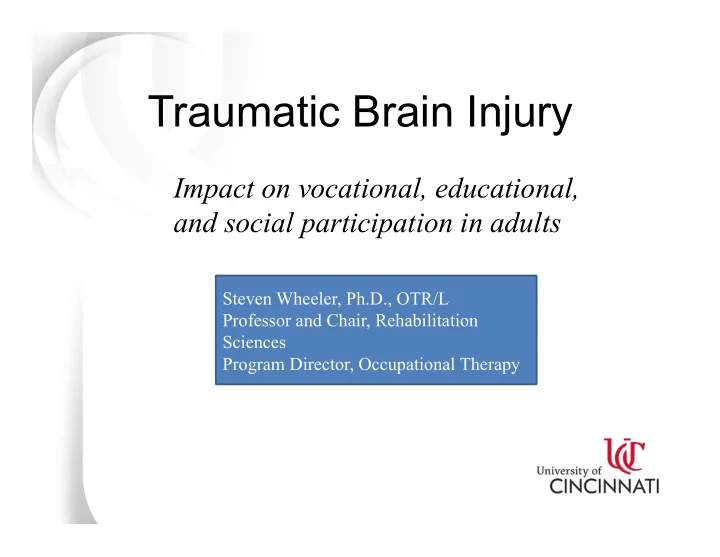

Traumatic Brain Injury Impact on vocational, educational, and social participation in adults Steven Wheeler, Ph.D., OTR/L Professor and Chair, Rehabilitation Sciences Program Director, Occupational Therapy
Session Objectives Discuss how executive dysfunction can impact one’s ability to participate successfully in adult roles and relationships • Describe the role of goal setting in the assessment and treatment process following TBI • Identify how the relationship between impaired awareness of deficits and self- reported life satisfaction impacts community participation • Identify the components of the “Whatever it Takes” approach to TBI rehabilitation
Recovery from Moderate to Severe TBI • Recovery can vary significantly among individuals necessitating a very individualized approach to care and rehabilitation • Areas of impairment include: – Physical / Sensorimotor – Psychological / Emotional – Behavioral – Cognitive – Social
Participation following TBI: The Importance of “Doing” • Involvement in school, • VIDEO work, and productive activities: – Consistently associated with better post TBI quality if life – Contribute to self-esteem, and gives one a sense of control over one’s life – Provides structure and routine – Afford social opportunities and contributes to higher independent living
Factors Contributing to Life Satisfaction Post-TBI • Employment status • Marital status / family satisfaction • Absence of depressed mood • Not having a pre-injury history of substance abuse • Motor independence
Establishing work related baselines • Physical Performance • Cognitive Abilities • Psychological Impairments • Behavioral Issues • Social Abilities • Vision
Elements of the Learning Process Rehearsal Long Short Sensory Term Term Memory Memory Memory Information from the environment Forgetting Forgetting
Categories of Executive Cognitive Functions Problem Solving Goal Setting Self-Awareness Mental Productive and Satisfying Daily Routine Flexibility Initiation Abstraction / Self-Monitoring Planning Generalization
• Damage to frontal lobes and subcortical limbic system contribute to impaired executive functions • Profound impact on all aspects of higher level behavior and participation (home, social, vocational, leisure) – initiation, motivation, attention, learning, impulse control, conformity to social norms, and ability to anticipate consequences
Functional Assessment and Intervention • Step 1: Goal Setting • VIDEO • Facilitates personal ownership of limitations and challenges • Sets early foundation for message of client – therapist collaboration • Brings meaning to the treatment interventions • Critical aspect of motivation / compliance
Formalizing the goal setting process Therapists and caregivers often • VIDEO try to “help” without an appreciation of what a client wants and what is most important to them Goals: – Establishing baseline levels of goals importance, satisfaction, and performance in addition to client self-awareness – Foundation for therapeutic relationship building - Communicates caring and empathy
• At elevated risk for: – Making poor judgment decisions – Difficulty developing adequate coping skills – Experiencing difficulty coping with change – Difficulty establishing and maintaining friendships
Learning by Doing – successes and failures • A word of caution • While self-awareness is generally felt to be beneficial or even required for successful rehabilitation, improvements in awareness have also been linked with emotional distress.
Learning By Doing – Physical capacity • VIDEO Assessment of performance establishes baseline levels of functioning, fosters self-awareness, and allows goals to be adjusted in a collaborative manner
Learning by Doing – Baseline Assessment video video
Some Additional Considerations During Recovery – Self-esteem / self-confidence – Environmental demands – Environmental supports
Impact of deficits on family / caregivers • Marriage / intimacy • Depression • Social isolation • Decreased productivity / leisure
1. Be unconditional 2. Be client-centered 3. Be credible 4. Be consistent 5. Be consistent in your role - Adhere to professional boundaries
Facilitating Community Participation following TBI: Whatever it Takes … . • No two individuals are • Natural supports last alike longer than professionals • Skills generalize best • Interventions must not do when taught in real more harm than good environments • Service system prevents • Environments easier to many barriers change than people • Respect for individual • Community integration is paramount holistic • Needs of individuals can • Life is a place and train last a lifetime – so should venture resources Willer and Corrigan, 1994
Client Centeredness and Task Progression • VIDEO • VIDEO
Treating Executive Functions: Task Progression with Feedback
Treating Executive Functions: Task Progression and Feedback
Treating Executive Functions: Task Progression and Feedback
Relationship Building and the Emergence of “Self”
Conclusions: Key Concepts in Treatment and Recovery • If relationships are always • Clinician / client relationship “great” during the therapy serves as a central process – functional mechanism for change improvements may not be occurring • Collaborative approach to Important to challenge the client build clients self-efficacy and - Makes goal achievement more self-esteem meaningful - Has a long term impact - Fosters self-awareness and • People will work hardest for other aspects of executive people who “matter” to them cognitive performance
Thank You
Ü Center for Outcomes Measurement in Brain Injury. h7p://www.tbims.org/combi/index.html - source of scales / quesConnaires Ü Doig, E. Fleming, J., Cornwell, P., & Kuipers, P. (2009). QualitaCve exploraCon of a client-centered, goal- directed approach to community based occupaConal therapy for adults with traumaCc brain injury. American Journal of Occupa1onal Therapy, 63 (5), 559-568. Ü Malia, K., Bewick, K., Raymond, M., and Bennet, T. (2002). ExecuCve FuncCons. AusCn, TX: Pro-Ed. Ü Unsworth, C. (1999). CogniCve and Perceptual DysfuncCon: A Clinical Reasoning Approach to EvaluaCon and Treatment. Philadelphia, PA: FA Davis Ü Wheeler, S., Lane, S., and McMahon, B. (2007). Community parCcipaCon and life saCsfacCon following intensive, community based, rehabilitaCon using a life skills training approach. OccupaConal Therapy Journal of Research, 27(1), 13-22. Ü World Health OrganizaCon (2001). The InternaConal ClassificaCon of FuncConing, Disability, and Health. Geneva: WHO.
Recommend
More recommend